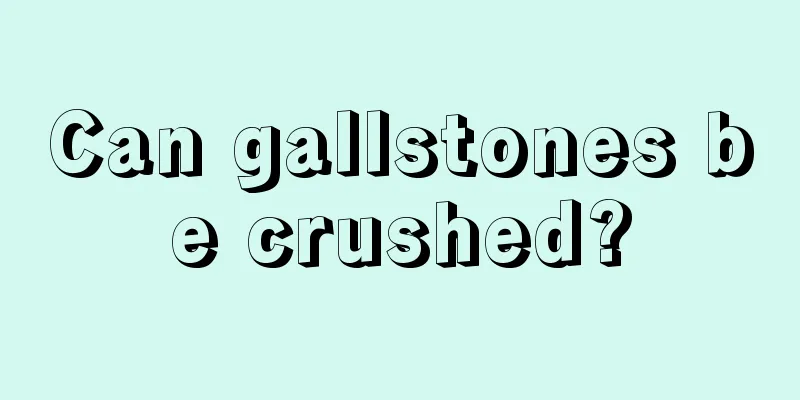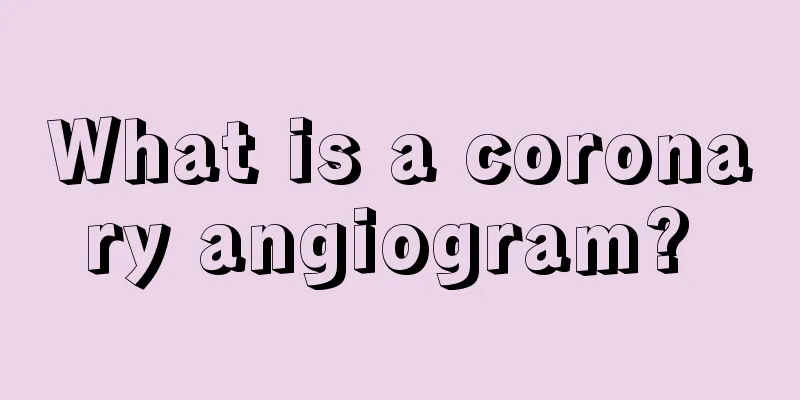Can gallstones be crushed?

|
Gallstones are a very common disease in daily life. It not only causes great harm to the patient's physical health, but also seriously affects their normal life and work. Therefore, it is particularly important to find a scientific and effective treatment method. However, many people in life do not know whether gallstones can be broken. The answer is of course no, because it may cause blockage and cause more serious diseases. 1. Gallbladder stones cannot be broken or dissolved. The lithotripsy in the hospital is mainly used to crush kidney stones and ureteral stones. After it is broken into pieces, you can excrete the broken stones by drinking more water and urinating. The gallbladder cannot dissolve stones. If the stones can be dissolved, then the strong solvent may also dissolve the gallbladder. The gallbladder cannot break up stones either. If it is a big stone, it will not fall from the gallbladder duct into the common bile duct; the lowest end of the common bile duct, the opening where it enters the intestine, is like a funnel, getting thinner and thinner. If it is broken into pieces, it will block the opening and cause renal syndrome. More serious cases are cholangitis or acute cholangitis, which are fatal diseases. 2. Relatively conservative treatment For patients with acute cholecystitis, anti-inflammatory and bile-draining treatments are generally adopted. In the first three days of acute cholecystitis, cholecystectomy can be performed; if the gallbladder and surrounding tissues are edematous after three days, there is a certain risk in surgery because it may accidentally injure the common gallbladder duct and other tissues. The gallbladder can be saved through conservative treatment. If the baby cannot be saved, a cholecystostomy may be needed, which is mainly to suck out the bile that has pus or is infected with bacteria in the gallbladder. Wait three months later, and then have a second operation to remove the gallbladder. At this time, the operation will be safe. 3. Not advocating gallbladder preservation and stone removal Twenty years ago, in order to cater to the patients' reluctance to have their gallbladders removed, the treatment measure generally adopted was to preserve the gallbladder and remove the stones. This practice is not recommended now. Why is that? Because gallstones or cholecystitis have two dangers: the first is that it causes pain. When the disease strikes, I feel very uncomfortable, with fever, pain, and I dare not eat oily food. The second is that there are stones rubbing inside, which will become chronic cholecystitis, which is a precancerous lesion. Over time, it may turn into gallbladder cancer. Once you get gallbladder cancer, the average survival time is often only about six months, so you cannot wait until you get gallbladder cancer to have surgery to remove it. If you just do a gallbladder-preserving stone removal surgery, the stones will be removed, but the gallbladder may grow stones again. In addition, the gallbladder may have a tendency to become cancerous. The longer the time, the greater the chance of cancer. So under what circumstances does a patient need to have his gallbladder removed? The first is the repeated attacks of acute cholecystitis; the second is that if the gallbladder stones are larger than two centimeters, even if there are no symptoms, it is recommended to remove the gallbladder; the third is the appearance of full gallstones, that is, the gallbladder is full of stones. At this time, the gallbladder function is severely atrophied, and it cannot discharge bile to digest fat. The risk of gallbladder cancer increases, and it must be removed; fourth, patients with biliary pancreatitis need to do it, because the bile duct and pancreatic duct open together. When small stones in the gallbladder duct are discharged and block the pancreatic duct, it will cause pancreatitis. Pancreatitis is a very dangerous disease. Fifth, surgery is also recommended for gallbladder polyps with a thickness of more than 1 cm. Gallbladder polyps generally refer to lesions that protrude or bulge within the gallbladder cavity. Single large polyps have a higher chance of becoming cancerous, so resection is recommended. |
<<: Will gallstones cause abdominal bloating?
>>: How long does it take to recover after gallstone surgery
Recommend
What are the effects of green radish flowers
Green ivy is a common ornamental evergreen vine p...
What are the symptoms of gallbladder cancer associated with intestinal adhesions
What are the symptoms of gallbladder cancer with ...
What is the cure rate of breast cancer metastasis to the lungs
What is the cure rate of breast cancer metastasis...
What are the sequelae of radiotherapy for breast cancer
Breast cancer is a common malignant tumor disease...
Lynch syndrome and endometrial cancer
Lynch syndrome patients have a significantly incr...
Where is the most professional place to treat bile duct cancer
Many people are very eager to be cured after bein...
Sweating makes clothes turn yellow
If you do not pay attention to personal hygiene r...
How to do radiotherapy care for esophageal cancer
Radiotherapy is one of the key methods for treati...
What does left hand numbness mean? This is the root cause of hand numbness!
If you usually experience numbness in your left h...
What are the early symptoms of brain cancer?
Brain cancer is a malignant tumor in the brain. T...
What are the things to pay attention to in the care of lung cancer? Things to pay attention to in the care of lung cancer
Lung cancer is a difficult disease to treat. In a...
Is spring feather flower poisonous?
Keeping some potted plants at home will make it l...
War Traumatic Syndrome
No matter what the purpose of launching a war is,...
What can't you eat if you have goiter
The thyroid gland is an important endocrine organ...
How to treat multiple lesions of liver cancer? Radiotherapy is relatively better
How to treat multiple lesions of liver cancer? Th...









